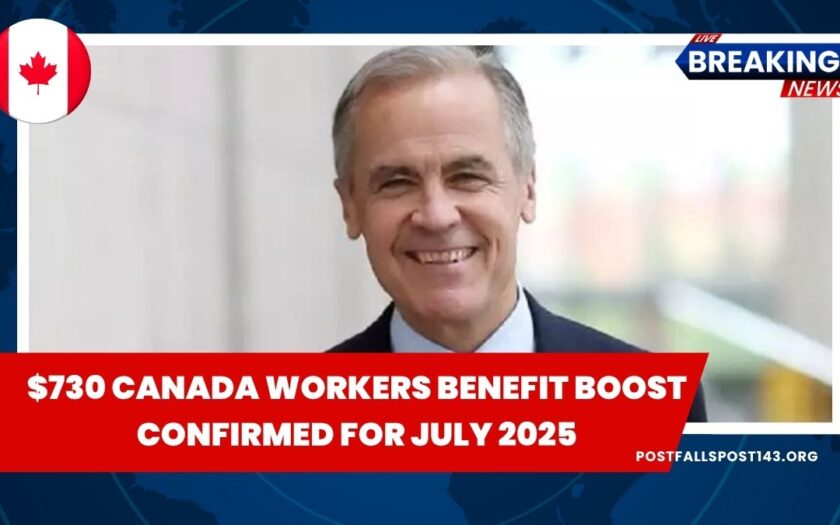With inflation and the cost of living continuing to affect millions of Canadians, the Canada Revenue Agency (CRA) has announced an updated $730 Canada Workers Benefit (CWB) payment for July 2025.
This first advance instalment for the 2025–26 benefit year could offer a much-needed financial boost to low-income workers and families, especially those who also qualify for the Disability Tax Credit (DTC).
What Is the Canada Workers Benefit (CWB)?
The CWB is a refundable tax credit designed to support low-income individuals and families who are gainfully employed but still face financial challenges. The benefit consists of two components:
- Basic Amount – For all qualifying low-income workers
- Disability Supplement – Additional payment for those eligible for the DTC
What Is the Advanced Canada Workers Benefit (ACWB)?
Rather than waiting for your full refund at tax time, 50% of your CWB is automatically paid in advance across three instalments in July, October, and January. This system helps improve monthly cash flow for working Canadians.
The July 11, 2025 payment kicks off this cycle, with increases reflecting inflation adjustments and updated income thresholds.
Who Is Eligible for the CWB?
To qualify for the CWB, you must:
- Be a Canadian resident throughout 2025
- Be at least 19 years old by December 31, or live with a spouse/partner or dependent
- Earn working income and have a family net income under the provincial limit
You are not eligible if:
- You were a full-time student for more than 13 weeks (unless you have dependents)
- You were incarcerated for over 90 days
- You are exempt from Canadian taxes
To receive the Disability Supplement, you must be eligible for the Disability Tax Credit (DTC) via Form T2201.
Canada Workers Benefit – 2025 Income Thresholds & Amounts
| Category | Maximum Benefit | Reduction Starts | Cut-Off Income |
|---|---|---|---|
| Single (Basic) | $1,590 | $26,149 | $36,749 |
| Family (Basic) | $2,739 | $29,833 | $48,093 |
| Disability Supplement (Single) | $821 | $36,748 | $42,222 |
| Disability Supplement (Family) | $821 per adult | $48,091 | Up to $59,038 |
Note: Amounts may vary slightly in Quebec, Nunavut, and Alberta due to provincial adaptations.
How Much Will You Get in July 2025?
| Recipient Type | July 2025 Advance Amount |
|---|---|
| Single (Basic only) | $265 |
| Family (Basic only) | $456.50 |
| Disability Supplement (per adult) | $136.83 |
| Family with 2 adults eligible for both | Up to $730.17 |
How to Apply for the CWB
There is no separate application required for the Canada Workers Benefit. You apply by:
- Filing your annual tax return
- Ensuring Schedule 6 is completed (automatically done via online tax software)
- Submitting your Disability Tax Credit certificate (Form T2201) if applicable
If you filed your return before November 1, 2025, the CRA will issue advance payments automatically.
Is the Canada Workers Benefit Taxable?
No. The CWB is not taxable. It either:
- Reduces the tax you owe, or
- Results in a refund, even if you owe zero income tax
Advance payments are part of your total annual benefit.
Advance Payment Dates for 2025–2026
| Instalment | Date |
|---|---|
| 1st Payment | July 11, 2025 |
| 2nd Payment | October 10, 2025 |
| 3rd Payment | January 12, 2026 |
The $730 Canada Workers Benefit provides essential relief for working Canadians grappling with everyday expenses. With higher payouts and expanded eligibility in 2025 due to inflation adjustments, now is the perfect time to ensure you’re receiving what you’re entitled to.
File your tax return on time, confirm your DTC eligibility if needed, and take full advantage of this valuable support program.
FAQs
When will the next CWB advance payment be issued?
The next payments are scheduled for October 10, 2025 and January 12, 2026.
Is there a separate application for the CWB or ACWB?
No. Just file your tax return with the correct details. Advance payments are automatically issued.
Can I receive the disability supplement if I don’t qualify for the basic CWB?
Yes. If you’re eligible for the DTC, you can receive the disability supplement even if your income is too high for the basic amount.
